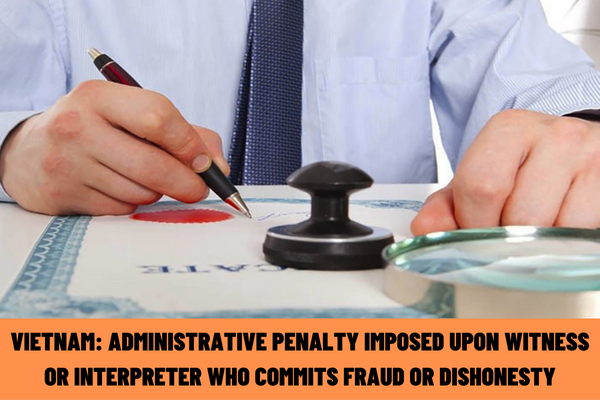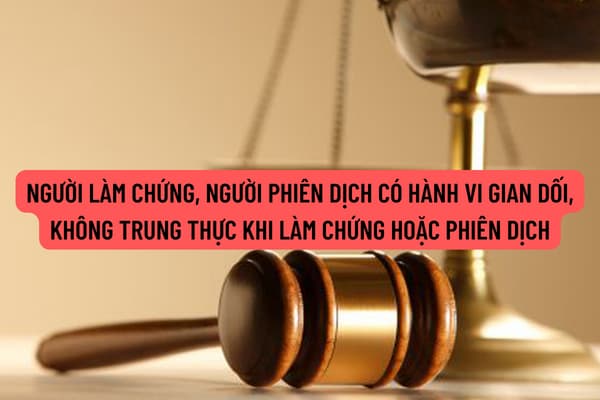Vietnam: What is the administrative penalty imposed on a witness or interpreter who commits fraud or dishonesty when testifying or interpreting?
What acts are organizations and individuals prohibited regarding notarization activities?
According to Clause 2, Article 7 of the 2014 Law on Notarization in Vietnam on the prohibited acts as follows:
Prohibited acts
...
2. Organizations and individuals are prohibited from committing the following acts:
a/ Pretending to be notarization requesters;
b/ Notarization requesters providing false information and documents or using counterfeit or illegally erased or modified papers and documents to request notarization;
c/ Witnesses or interpreters committing deceitful or dishonest acts;
d/ Obstructing notarial activities.
Thus, according to regulations, it is strictly prohibited for individuals and organizations to perform the acts as prescribed above.

Vietnam: What is the administrative penalty imposed on a witness or interpreter who commits fraud or dishonesty when testifying or interpreting? (Image from the Internet)
What is the administrative penalty imposed on a witness or interpreter who commits fraud or dishonesty when testifying or interpreting?
Pursuant to the provisions of Article 12 of Decree No. 82/2020/ND-CP, violations against regulations related to notarization of contracts, transactions and translations are prescribed as follows:
Violation against regulations related to notarization of contracts, transactions, and translations
1. A fine of between VND 7,000,000 and 10,000,000 shall be imposed for one of the following acts:
a) Erasing, correcting and falsifying contents of papers and documents issued by competent agencies, organizations or persons in order to have contracts, transactions or translations notarized;
b) Using papers and documents issued by competent agencies, organizations or persons that have been erased or corrected to falsify their contents in order to have contracts, transactions or translations notarized.
2. A fine of between VND 10,000,000 and 15,000,000 shall be imposed for one of the following acts:
a) Deception or dishonesty when testifying or interpreting;
b) The translation is inaccurate or inconsistent with the papers or documents to be translated.
3. A fine of between VND 20,000,000 and VND 30,000,000 shall be imposed for one of the following acts:
a) Forge, hire or ask another person to impersonate a notarization requester; forge, hire or ask others to impersonate a person with interests and obligations related to a contract or transaction in order to notarize the contract or transaction; forging signatures of notarization requesters;
b) Request for notarization of fake contracts or transactions;
c) Providing untruthful information and documents to notarize contracts or transactions;
d) Providing untruthful information and documents to notarize the translation;
d) Obstructing notarization activities.
4. Additional sanctioning forms:
Confiscate material evidences which are papers and documents that have been erased or modified to falsify their contents, for violations specified in Clause 1 of this Article.
5. Remedial measures:
a) Forcing notarial practice organizations that are keeping notarization dossiers to notify agencies, organizations and individuals with related rights and obligations of violations specified in Clause 2, Points a and b and c Clause 3 of this Article;
b) Forcing the notarial practice organization that is storing notarization dossiers to notify on the portal of the Department of Justice where it is headquartered about the notarized translation specified in Clause 1 and Point d Clause 3 of this Article. This;
c) Proposing competent agencies, organizations and persons to consider and handle papers and documents that have been erased or corrected to falsify the contents specified in Clause 1 of this Article.
Thus, according to the regulations, witnesses and interpreters who commit acts of deception or dishonesty when testifying or interpreting may be administratively sanctioned up to VND 15,000,000. At the same time, the remedial measure must be taken, which is to force the notarial practice organization that is storing notarization records to notify agencies, organizations and individuals with related rights and obligations of the violations specified in Clause 2 of this Article
The fine prescribed above is imposed upon individuals, the fine imposed upon organizations is 2 times higher than that imposed upon individuals.
Can persons under 18 years old be witnesses or interpreters?
According to Article 47 of the 2014 Law on Notarization in Vietnam stipulating notarization requesters, witnesses and interpreters as follows:
Notarization requesters, witnesses and interpreters
1. Notarization requesters being individuals must have civil act capacity.
For notarization requesters being organizations, notarization requests shall be made through at-law representatives or authorized representatives of these organizations.
Notarization requesters shall produce all necessary papers related to the notarization and take responsibility for the accuracy and lawfulness of such papers.
2. In case notarization requesters cannot read, hear, sign or press fingerprints, or in other cases prescribed by law, witnesses are required during notarization.
Witnesses must be full 18 years or older, have full civil act capacity and have no rights, interests or obligations related to the notarization.
Witnesses shall be invited by notarization requesters or, if notarization requesters cannot invite witnesses, be designated by notaries.
3. Notarization requesters who are not fluent in Vietnamese must have interpreters.
Interpreters must be full 18 years or older, have full civil act capacity, and are fluent in Vietnamese and the language used by notarization requesters.
Interpreters shall be invited by notarization requesters and take responsibility before law for their interpretation.
Thus, according to regulations, witnesses and interpreters must be over 18 years old. Persons under the age of 18 may not act as witnesses or interpreters.
LawNet
